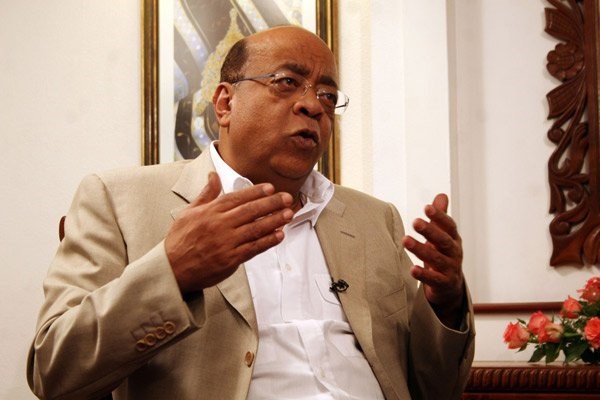
Wednesday March 1, 2017

Mo Ibrahim of Mo Foundation. The Mo Ibrahim Prize Committee has announced that for the second year in a row, it had not found anyone to award its Prize for Achievement in African Leadership. PHOTO | FILE | NATION MEDIA GROUP.
The Mo Ibrahim Foundation says it has found no winner, again, for its prestigious Ibrahim Prize for Achievement in African Leadership.
The selection Committee chaired by Tanzanian diplomat and former OAU Secretary General Salim Ahmed Salim on Tuesday said none of the recently retired heads of state on the continent had merited the prize.
HIGH BAR
“As I emphasise each year, a very high bar was deliberately set when the Prize was launched in 2006. We recognise and applaud the important contributions that many African leaders have made to change their countries for the better,"
Dr Salim said in a statement released after the Committee met with the Foundation's Board.
"But the Prize is intended to highlight and celebrate truly exceptional leadership, which is uncommon by its very definition. After careful consideration, the Committee has decided not to award the Prize in 2016."
Launched in 2006 by Sudanese-British tycoon Mo Ibrahim, the award seeks to reward from among African retired Presidents and other heads of state who left office within the past three years "having been democratically elected and served their constitutionally mandated term."
$5 MILLION
Winners are awarded $5 million spread over a decade and a further $200,000 annually for the rest of their lives, besides joining an exclusive club of elders often invited to speak at governance conferences around the continent.
The 2016 Prize looked at leaders who retired between January 2014 and December 2016.
It means Tanzania's Jakaya Kikwete, Ghana's John Mahama, Mozambique's Armando Guebuza and Nigeria's Goodluck Jonathan were potential contenders.
But despots like Burkina Faso's Blaise Compaore, who was chased out of town by an angry populace in 2015, and Gambia's Yahya Jammeh who stuck to power despite losing an election (and was only forcibly removed) in December 2016 were ineligible.
NO LEGACY
However, the Prize Committee said none of those who left properly had left a legacy worth rewarding.
It means no one has won the coveted prize often labelled as the African Nobel Prize for Presidents, since 2015 when Namibia's Hifikepunye Pohamba was awarded for 2014.
Since 2006, only four former African leaders have won it, meaning that no one got it in six years.
CRITERIA
The previous Laureates include President Hifikepunye Pohamba of Namibia (2014), President Pedro Pires of Cabo Verde (2011), President Festus Mogae of Botswana (2008), and President Joaquim Chissano of Mozambique (2007).
South African anti-apartheid icon and first black President Nelson Mandela was the inaugural Honorary Laureate in 2007.
The criteria used by the committee to select a winner include the requirement that all eligible contenders be former heads of state or government who left office in the previous three years.
WISE LEADERSHIP
The leaders should also have been democratically elected, served their constitutionally allowed terms and demonstrated exceptional leadership.
In 2014 edition, President Pohamba, was awarded for demonstrating “sound and wise leadership" while maintaining "his humility throughout his Presidency.”
There were no winners in 2009, 2010, 2012 and 2013.
In 2015, the Foundation said that lack of winners was more because of tough conditions than poor leadership.
QUALITY
“The decision by the prize committee is a reflection of the exceptionally high bar set for potential winners rather than any disappointment with the overall quality of leadership on our continent.
“The tough criteria were deliberately set to ensure only the most outstanding would be considered,” said Sophie Masipa, head of communication at the foundation said at the time.